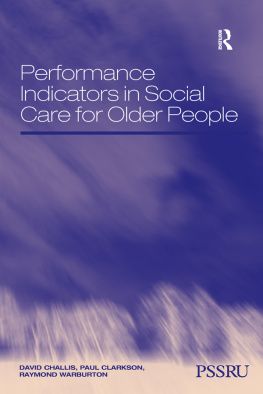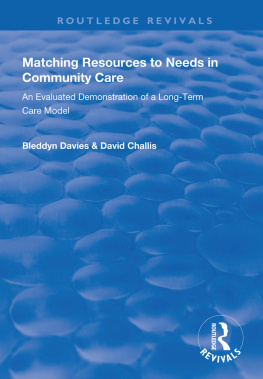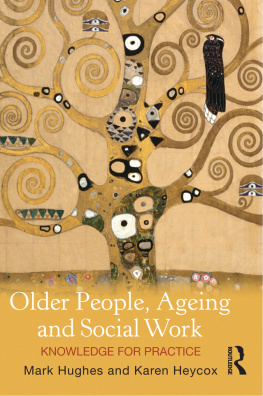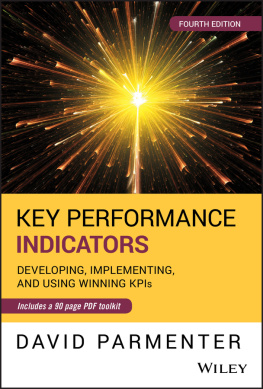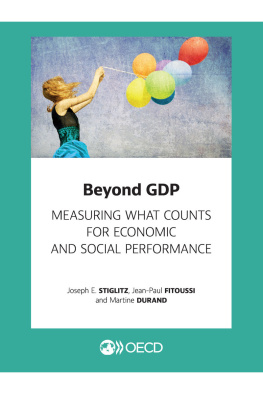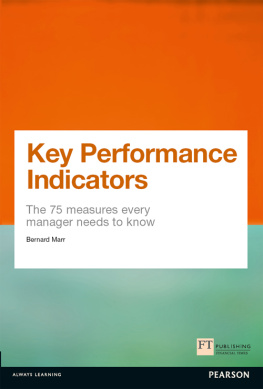PERFORMANCE INDICATORS
IN SOCIAL CARE FOR OLDER PEOPLE
Related Titles
in Association with PSSRU
Series Editors:
Professor David Challis, University of Manchester
Professor Martin Knapp, LSE
Professor Ann Netten, University of Kent
Long-Term Care: Matching Resources and Needs
Edited by Martin Knapp, David Challis, Jos-Luis Fernndez and Ann Netten
ISBN 0 7546 4341 7
Towards Quality Care
Outcomes for Older People in Care Homes
Caroline Mozley, Caroline Sutcliffe, Heather Bagley,
Lis Cordingley, David Challis, Peter Huxley and Alistair Burns
ISBN 0 7546 3172 9
Care Management in Social and Primary Health Care
The Gateshead Community Care Scheme
David Challis, John Chesterman, Rosemary Luckett, Karen Stewart
and Rosemary Chessum
ISBN 1 85742 206 6
Equity and Efficiency Policy in Community Care
Needs, Service Productivities, Efficiencies and Their Implications
Bleddyn Davies and Jos-Luis Fernndez
ISBN 0 7546 1281 3
Caring for Older People
An Assessment of Community Care in the 1990s
Linda Bauld, John Chesterman, Bleddyn Davies,
Ken Judge and Roshni Mangalore
ISBN 0 7546 1280 5
The Personal Social Services Research Unit is based at three branches, at the University of Kent, the London School of Economics and the University of Manchester. The Unit undertakes social and health care research, supported mainly by the Department of Health, and focusing particularly on policy research and analysis of equity and efficiency in community care, long-term care and related areas including services for elderly people, people with mental health problems and children in care.
The PSSRU website is at www.pssru.ac.uk.
Performance Indicators
in Social Care For Older People
DAVID CHALLIS
PSSRU, University of Manchester, UK
PAUL CLARKSON
PSSRU, University of Manchester, UK
RAYMOND WARBURTON
Department of Health, UK,
formerly PSSRU, University of Kent, UK


First published 2006 by Ashgate Publishing
Published 2016 by Routledge
2 Park Square, Milton Park, Abingdon, Oxon OX14 4RN
711 Third Avenue, New York, NY 10017, USA
Routledge is an imprint of the Taylor & Francis Group, an informa business
Copyright 2006 Personal Social Services Research Unit
David Challis, Paul Clarkson and Raymond Warburton have asserted their right under the Copyright, Designs and Patents Act, 1988, to be identified as the authors of this work.
All rights reserved. No part of this book may be reprinted or reproduced or utilised in anyform or by any electronic, mechanical, or other means, now known or hereafter invented, including photocopying and recording, or in any information storage or retrieval system, without permission in writing from the publishers.
Notice:
Product or corporate names may be trademarks or registered trademarks, and are used only for identification and explanation without intent to infringe.
This work was undertaken by the PSSRU, which receives support from the Department of Health; the views expressed in this publications are those of the authors and not necessarily those of the Department of Health.
British Library Cataloguing in Publication Data
Challis, David, 1948
Performance indicators in social care for older people
1.Older people Services for Evaluation
I. Title II. Clarkson, Paul III. Warburton, Raymond
IV. University of Kent at Canterbury. Personal Social
Services Research Unit
362.6
Library of Congress Control Number: 2006928104
ISBN 9780754647447 (hbk)
Transfered to Digital Printing in 2012
Contents
Performance indicators are a relatively new development in social care services but their development and use has been of long duration in other areas of private finance and in the public sector more generally. The use of these indicators is not without its problems and it is the purpose of this study to examine their development and use in the area of social care for older people. This has been done though the commissioning of work by a local authority Social Services Department on the use of performance indicators to measure their community care services.
During the 1990s Cheshire Social Services Department (SSD) commissioned the Personal Social Services Research Unit (PSSRU) to recommend, develop and then help to implement and monitor a set of performance indicators for services to older people. The result was an integrated suite of local performance measures set within an organising framework, the Performance Indicator Analytic Framework (PIAF) contained within this book.
This book is directed at a social care audience, particularly those policy makers, researchers, managers and practitioners interested in methods of appraisal, which permit their work to be planned and evaluated on a department-wide basis. It has many links and resonances with recent national concerns about how well social services are performing in their functions. In this respect we believe it to be both timely and relevant to the needs of social services personnel at a critical time in the history of social care.
A number of present and former Cheshire County Council staff members have contributed to this study through their work as colleagues in developing this work, interviews with them and in the provision of information concerning services for older people in Cheshire. We thank in particular; Colin Berg, Helen Black, Sue Crompton, Jonathan Cope, Kevin Miller, Judy Scott, John Webb and David Whyte. They were a very stimulating group of colleagues with whom to work. The analysis in owes much to David Whyte, Business Manager for his progress reports describing the way performance indicators had been used in Cheshire. We are grateful also to both the Directors of Social Services who were involved during this work, Neil Singleton and Jo Williams, for their support.
Finally at PSSRU, this book has been a genuine tripartite effort of authorship. Raymond Warburton, prior to his work at the Department of Health, was a key driver in the thinking, planning and development of the performance indicators in collaboration with Cheshire colleagues. Paul Clarkson has been central in the crafting of the work into this book reflecting the background, analytic framework, performance measures and their implementation. The manuscript was prepared for publication by Nick Brawn with his customary skill.
David Challis
Professor of Community Care Research,
Personal Social Services Research Unit, University of Manchester
Chapter 1
The Emergence of Performance Review
The Government are very keen on amassing statistics they collect them, add them, raise them to the nth power, take the cube root and prepare wonderful diagrams. But what you must never forget is that every one of those figures comes in the first instance from the village watchman, who just puts down what he damn pleases.
(Stamp, 1929, pp. 258259)
Measuring the performance of whole health and long term care systems is set to become a defining issue in the 21st century (Mulligan et al., 2000; United Nations, 2002; World Health Organisation, 2000). In the UK, a number of documents testify to the greater measurement and regulation of both health and social care activity at a national level. Recent initiatives for the organisation and management of community and long-term care are being shaped by the use of performance information in a way inconceivable even ten years ago. Community care services, particularly those for frail older people, which represent the bulk of social care expenditure, lend themselves to the use of such monitoring systems. Problems remain, however, in translating the need for such data into adequate systems for monitoring the quality of services, particularly at the local level. This book brings together a framework for integrated local performance evaluation with a series of exemplar indicators which may be employed as part of this framework grounded in the lessons of early development in one locality. It is designed to contribute to more comprehensive and effective performance measurement processes in social care.

